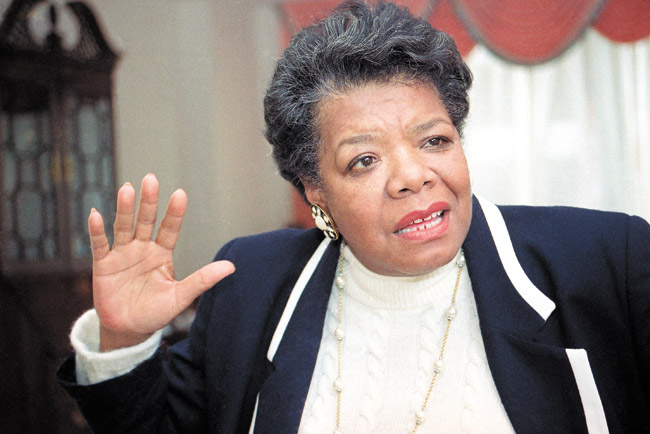Maya Angelou’s Power Lives On
I can’t believe I took her for granted.
Maya Angelou died last Wednesday. Her physical presence is no longer on this earth, and for that I cried. I wish I had read — and reread — every one of her poems instead of letting them sit forgotten in my library. I wish I had followed through on reading her other autobiographies after having finished — and loved — I Know Why the Caged Bird Sings.
She was so much more than a writer and a poet. She was a civil rights activist who worked with Dr. Martin Luther King. A feminist. Lover. Fighter. Playwright.
Actor. Singer. Jack-of-all-trades and master of many.
Inspiration.
I wish I’d written her a fan letter.
Maya Angelou’s voice spoke to me, as it did millions of others. Each time I read her words I understood something more about myself — more personal, more loving, more rage-filled, more hopeful …
More forgiving.
In the very first few pages of I Know Why the Caged Bird Sings, Angelou described my own almost forgotten, self-delusional childhood fantasies. She echoed back to me what it felt like to be a girl growing up Not White in a white world, judging herself by an impossible beauty standard.
“Wouldn’t they be surprised when one day I woke out of my black ugly dream, and my real hair, which was long and blond, would take the place of the kinky mass that Momma wouldn’t let me straighten? My light-blue hazel eyes were going to hypnotize them, after all the things they said about ‘my daddy must have been a chinaman’ (I thought they meant made out of china, like a cup) because my eyes were so small and squinty …”
Yes, I thought when I read those words. She is inside my 6-year-old head. She must have seen how, as a little Asian-American girl, I had fantasized about being the blond princess swept away by a handsome knight. How could she know what had been in my heart and in my head?
“… Because I was really white and because a cruel fairy stepmother, who was understandably jealous of my beauty, had turned me into a too-big Negro girl, with nappy black hair, broad feet and a space between her teeth that would hold a number-two pencil.”
By the time I read Angelou’s book, I was all grown up and had long ago come to terms with — and taken pride in — who I was and the cultures that made me what I am. But her heartaches, her struggles, her triumphs over self-hatred, violence and betrayals, and her growth into the strong, self-aware woman she would become resonated with me. Although the young Maya has been called a symbolic character for black girls growing up in American, I believe she represents all minority girls of a certain generation. I saw parts of myself — parts I had never shared with anyone — in young Maya.
One of my favorite Maya Angelou poems is the magnificent Still I Rise. It speaks of the courage, resilience and indomitable spirit of her people. I love its power. I think it applies to all people who seek freedom and equality in a cruel and hope-crushing world.
You may write me down in history
With your bitter, twisted lies,
You may trod me in the very dirt
But still, like dust, I’ll rise.
Does my sassiness upset you?
Why are you beset with gloom?
‘Cause I walk like I’ve got oil wells
Pumping in my living room.
Just like moons and like suns,
With the certainty of tides,
Just like hopes springing high,
Still I’ll rise.
Maya Angelou was that rarest of human beings, a literary giant and a true warrior of peace. Her weapons were her words, her convictions, her love for women and all of humanity. Her physical presence left us last Wednesday. Her spirit has already risen, unconquered and free.
Leaving behind nights of terror and fear
I rise
Into a daybreak that’s wondrously clear
I rise
Bringing the gifts that my ancestors gave,
I am the dream and the hope of the slave.
I rise
I rise
I rise.
jmoonjones@yahoo.com
Twitter: @JadeMoon1






